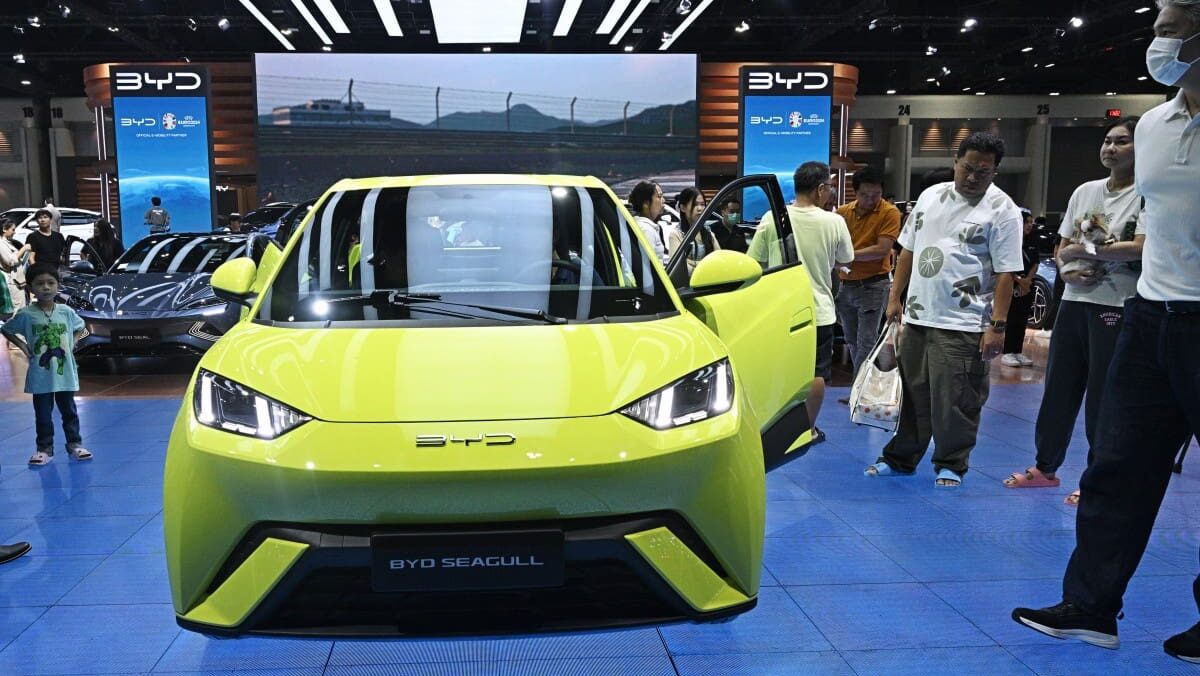
People look at a BYD Seagull car by Chinese electric vehicle (EV) manufacturer BYD Auto at the Bangkok International Motor Show in Nonthaburi on March 27, 2024.
Photo: Lillian SUWANRUMPHA / AFP
The European Commission announced a raft of new protectionist measures against Chinese-manufactured electric vehicles (EVs) on Wednesday. Claiming that Chinese companies benefit from ‘unfair’ subsidies, the Commission will introduce a new regime of tariffs, overruling German-led objections. However, manufacturer Tesla appears to have secured preferential treatment to protect itself from elements of the incoming protectionist policies.
Starting on July 4th, Chinese EVs will face tariffs on a sliding scale, topping out at 38.1% —on top of a pre-existing import duty of 10%. Commission spokesmen have warned of a “threat of economic injury” to the European economy caused by the lack of a level playing field for Chinese imports. The sliding scale tariff structure means manufacturers can land a lower tariff through revealing the extent of their state subsidies to the Commission.
Commission hostility towards Chinese EVs is paradoxical, since it would restrict the use of a potential mechanism for achieving Brussels’ (increasingly outlandish) Green Deal ambitions. In real terms, the impact of the new 38.1% tariff rate would increase the price of an “entry-level” EV from €30,000 to €41,450.
Brewing since last October, the protectionist measures have come amid concerns about European Union overdependence on Chinese manufacturers. Beijing officials have already indicated that they would retaliate against the new tariffs, having already placed fresh import duties on European luxury products, such as French brandy. The dispute between the EU and China is to be aired at the World Trade Organization.
The European Commission’s moves against the Chinese electric manufacturing industry come only weeks after the Biden administration moved to quadruple tariffs on Chinese cars in May.
European EV manufacturers are currently grappling with a multitude of crises, including soaring energy costs, a scramble for rare earth materials, and chaos on the Red Sea. EU companies are also struggling to mitigate the effect of similar U.S. protectionism under the Inflation Reduction Act (IRA). Meanwhile, the Franco-German alliance at the heart of EU decision-making is under strain from any potential economic schisms with China.
Major opposition to the EU’s new tariff regime against China has already been voiced by Berlin’s car manufacturers, including BMW. They fear profitability will be diminished by closing off the Chinese market. German Transport Minister Volker Wissing has lamented publicly that “punitive tariffs affect German companies and their top products.”
Tesla has already announced price hikes on its Model 3s in Europe. However, it may yet receive special treatment from the European Commission, in the form of an “individually calculated duty rate.”. It is reported a review will be carried out into the matter over the next nine months.
Brussels fears that cheap Chinese imports—beneficiaries of unfair state support—could flood the EU’s Common Market, crippling any attempts to foster native industry. This fear was heightened by the European launch of Chinese BYD’s affordable Dolphin and Seal car brands in March. It could mean EU consumers are expected to bear the brunt of the rising tide of protectionism, including their gradual loss of Chinese market access. Tesla is also reported to have begun reducing capacity at its Shanghai electric car factory.
Already in a fraught battle with Eurocrats over Big Tech regulation, Tesla owner Elon Musk has major leverage over European regulators, including his ownership of the bloc’s largest gigafactory manufacturing plant outside of Berlin, as well as effective control over Europe’s satellite capabilities following the imposition of Russian sanctions.
The geopolitics of electric car manufacturing in Europe have been further complicated by EU measures against a Chinese electric battery plant in Hungary, with the Hungarian government reacting negatively to the past week’s rising protectionist sentiment against Chinese manufacturers.
